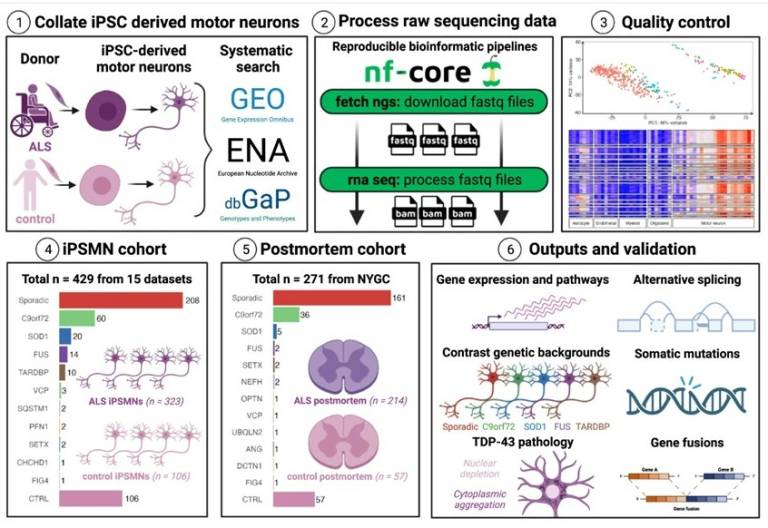New study uncovers a breakthrough in the understanding of motor neuron death in ALS
20 April 2023
New research led by UCL Queen Square Motor Neuron Disease Centre, UCL Queen Square Institute of Neurology, and the Francis Crick Institute, provides important new insights into the underlying mechanisms of motor neuron death in Amyotrophic Lateral Sclerosis (ALS)

Amyotrophic lateral sclerosis (ALS), also known as Motor Neuron Disease, is a devastating neurological disease that causes motor neurons to die, leading to muscle weakness and ultimately death. It has been challenging to access motor neurons to identify the underlying causes of the disease, due to high risk of complications that come with a biopsy of the fragile spinal cord. Researchers have turned to studying motor neurons derived from induced pluripotent stem cells (iPSC) to better understand ALS. However, previous iPSC studies were limited to small numbers of patients, and there is no consensus on how ALS develops.
"Our study adds to mounting evidence linking p53 activation - which may serve as an initial protective response to DNA damage - to the death of motor neurons in ALS. By analysing hundreds of iPSC-motor neurons and post-mortem spinal cord samples, we identified a consistently heightened DNA damage response across different ALS subtypes. This finding could lead to new strategies for preventing motor neuron loss and slowing the progression of ALS." Dr Oliver Ziff
Links
- Ziff, O.J., Neeves, J., Mitchell, J. et al. Integrated transcriptome landscape of ALS identifies genome instability linked to TDP-43 pathology. Nat Commun 14, 2176 (2023). https://doi.org/10.1038/s41467-023-37630-6
- Professor Patani's academic profile
- Dr Ziff's academic profile
- UCL Queen Square Motor Neuron Disease Centre, UCL Queen Square Institute of Neurology
Image
- Study overview: Schematic summarising analytic framework using iPSC-derived motor neurons (iPSMNs) and post-mortem tissue to interrogate perturbations across the spectrum of ALS. Made with BioRender.
 Close
Close

